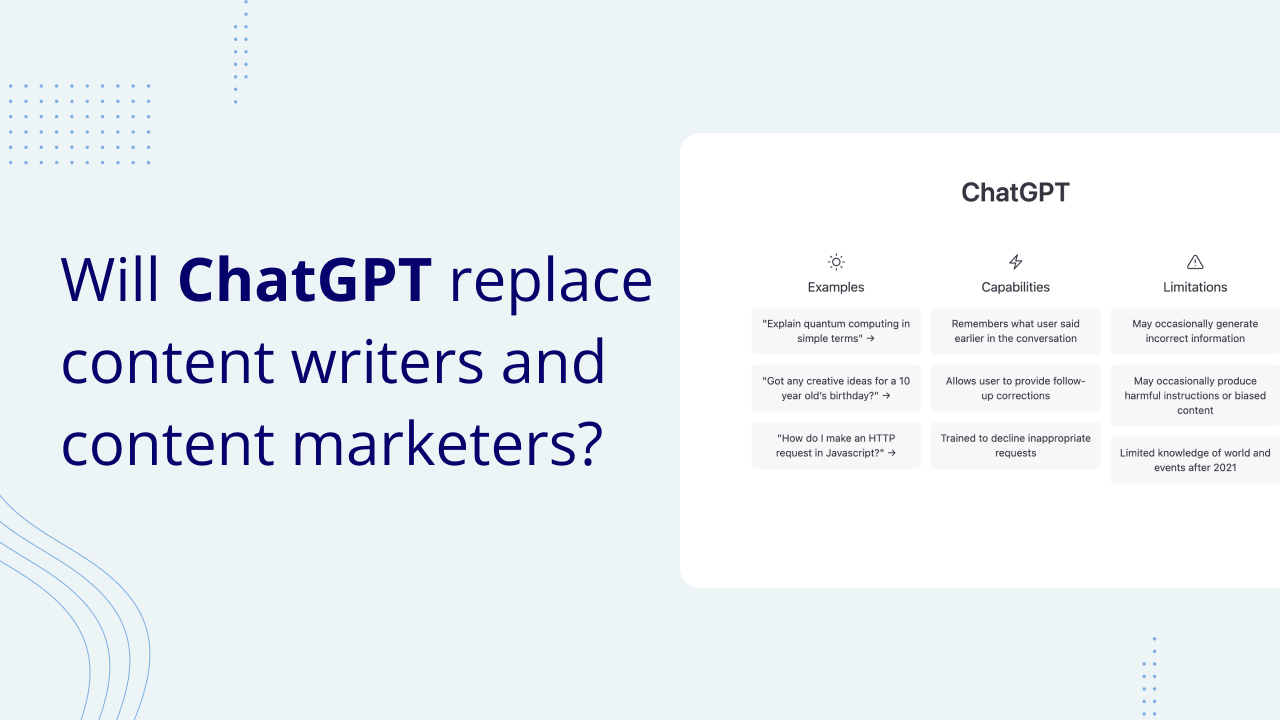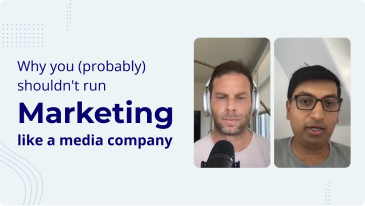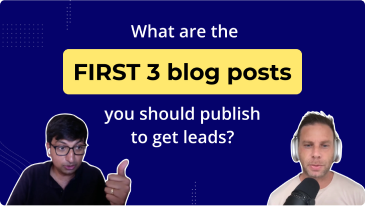Trying to get a marketing job is tough these days.
You spend hours of your time crafting a cover letter, tweaking your resume to match what the company is looking for, and send it in, only to hear crickets… No one responds.
Or even worse, you immediately get that dreaded email back from the company saying:
“Sorry, but you’re not a good fit for the role.” or
“Sorry, but we’ve filled the role already.”
You start to think to yourself:
“There’s no way anyone from the company even looked at my resume! This is a waste of time.”
And you start to get down on yourself thinking that you’ll never get the job you want.
This exact scenario has happened to me time and time again, and I keep hearing from friends that this situation is becoming even more prevalent. What’s worse, is that companies need good marketers but are having a hard time hiring for those roles.
If you’re a marketer looking for a new role, the way to get a job has fundamentally changed from what you’ve likely been told you should be doing.
Having spent the last 5 years on both sides of the spectrum, both as a hiring manager and as someone interviewing for new roles, I’m going to outline some learnings from over the years to help you land the marketing career you’ve always wanted.
But before I get into the advice for what you should be doing, It’s important to understand what you might be doing wrong first.
Why You’re Not Getting That Marketing Job You Want
You’re Applying for Jobs Way Above Your Experience Level
Stop applying for Manager, Director, and Vice President of Marketing level roles when you’re one or two years out of college with little to no experience. While you might think you can hold your own with a full-time job like that, you likely don’t have the experience yet to successfully execute in one of those roles.
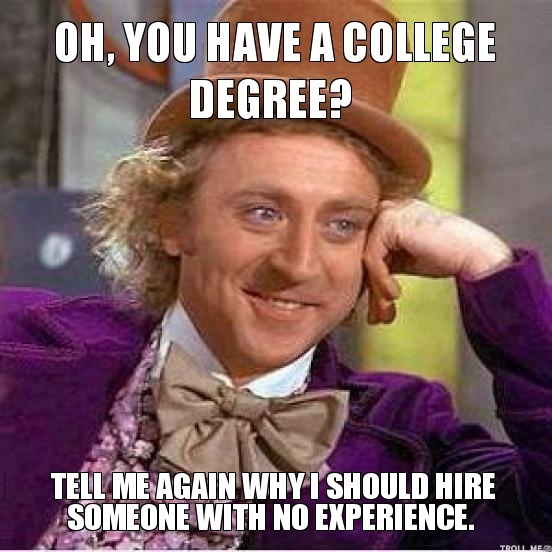
I used to be one of these people that thought I deserved a role like that out of college, however, after over five years as a practicing marketer, my perspective has changed (my old colleagues are probably laughing right now saying “I told you so”).
When I graduated college, I used to think that I knew it all when it came to marketing. I saw tons of opportunities that companies weren’t capitalizing on and therefore I thought I deserved a high-level role in a company. But what I quickly realized is that, while ideas are great, executing on them is more important.
Having a Manager, Director, or Vice President level role in a company is not just about having great ideas and it’s not about “marketing status”.
Having a high-level title in marketing is equally about your marketing chops as it is your effectiveness as a leader.
If you’re really early on in your career, you might have a great marketing mind, but you likely haven’t yet learned how to deal with politics in an organization, how to effectively manage and motivate others, or how to successfully market different types of products and services.
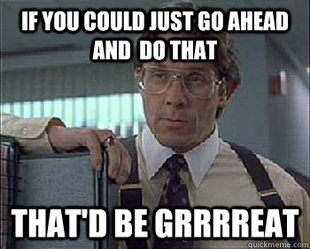
On the flip side, while you might think you want a high-level role, once you get into the corporate world you might figure out that you don’t want a high-level role because you like doing the work rather than managing the process from a high level. Some of the best marketers I know are individual contributors because they’re high performers but don’t like managing others. If you fall into that bucket, it’s okay, you don’t need to have a high title to gain a high status in the marketing world. You just need to do great work and have results to back up your efforts.
You Don’t Have a Clear Idea of the Type of Role You Want
When applying for roles, it’s important to know where your interests or skill sets lie. Typically if you land a first interview, it’s going to be an interview qualifying you.
The person on the other end of the phone might ask things like:
“Why do you think you’d be a good fit for the role?”
“What interests you about working for this company?”
“How does your past experience relate to what we’re looking for in this role?”
If you don’t have a clear idea of what you want in your next job, and don’t have good answers to those questions, you won’t see another round of interviews.
Don’t just apply to every job that has marketing in the title of it.
When you do this, you might end up with a lot of opportunities, but the job opportunities won’t be the ones you’re passionate about or enjoy doing.
Before you just start applying to any marketing role, take some time and really think about if you’d enjoy doing the work day in and day out.
You’re bullshitting your way through the interview process!
Don’t try to bullshit your way through the interview process.
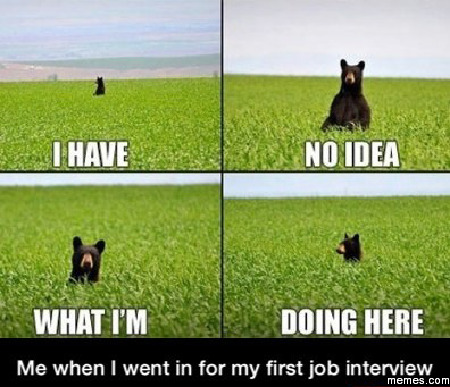
By doing this, you’re giving all marketers a bad reputation and wasting everyone’s time.
Hiring managers would rather hear that you don’t know how to do something and have you express your willingness to learn over listen to you fumble over an explanation from a blog post that you read the night before your interview.
Start showing concrete examples of things that you’ve done.
I started blogging as a way to show my expertise in marketing to others and I used my blog posts to help me land interviews.
Telling someone what you know about marketing isn’t as effective as showing them what you know about marketing through concrete examples.
For example, when I said I knew about content marketing and when someone asked “what have you done?”, I was able to send them this article on growing a blog.
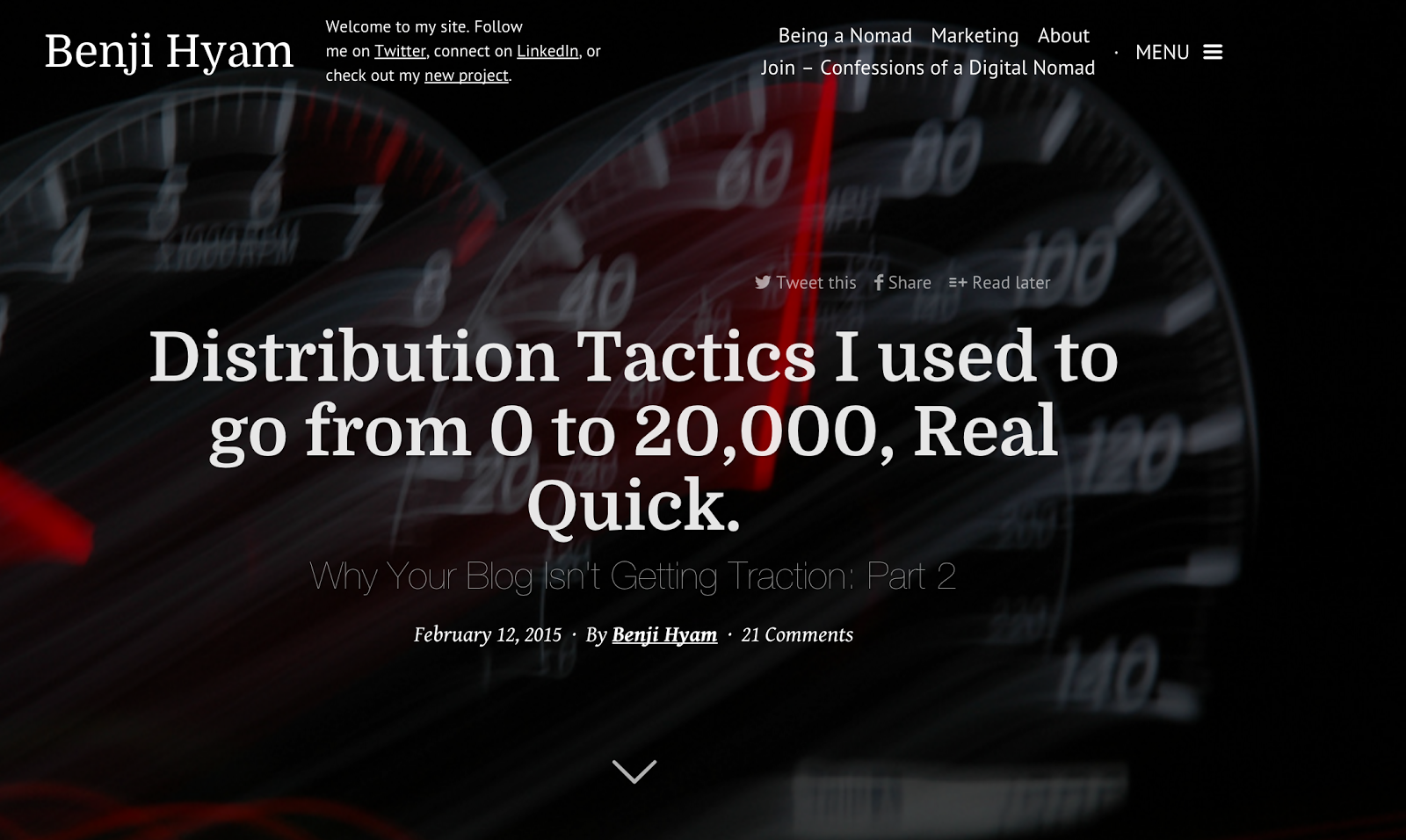
That specific blog post case studied real examples of things that I did at a prior company.
In interviews, I’ve said things like:
-
I grew blog traffic from ‘x’ to ‘y’
-
I increased our conversion rates from x% to y% and it had ___ impact on the company.
Note: I backed up these claims with examples that showed I knew what I was talking about. This way it left no question in the hiring manager’s mind that I knew what I was doing.
If you’re not a writer, don’t worry.
You can show that you know what you’re talking about by creating a plan for the company, outlining something they’re not doing well and how they could improve it, or by sharing an example of past work that you were responsible for.
How to Get the Marketing Job You’ve Always Wanted
Now that we’ve gone through the things that you shouldn’t do when applying for roles, let’s look at the things you should be doing to get a job these days.
First: Figure Out What Type of Role You Want
The most important thing you need to do before applying for jobs is to figure out what type of role you want. This is notoriously difficult for marketers, because they typically like many aspects of marketing and don’t know where they want to specialize or focus.
If you’re currently in a role, an exercise that has greatly helped me in the past, is to take out a sheet of paper, fold it in half, and write everything you like about your role on the right hand column. Then in the left hand column write down everything you don’t like about your current role (be as detailed as possible).
For example, on the right hand side you might say things:
I like teaching people
I like reading marketing articles
I like storytelling
I like working cross-functionally with different departments
I like managing people
I like coming up with ideas and implementing them
Then on the left hand side, you might say things like:
I don’t like posting on social media
I don’t maintaining a budget
I don’t like using excel
I don’t like being lead from the top down, etc.
From there, search for job postings in marketing that list out job responsibilities and map the things that you do like to the various roles that you come across.
Try to only apply for roles that list a majority of responsibilities that you would enjoy doing.
Here are 7 marketing job descriptions and salaries to help you on your search.
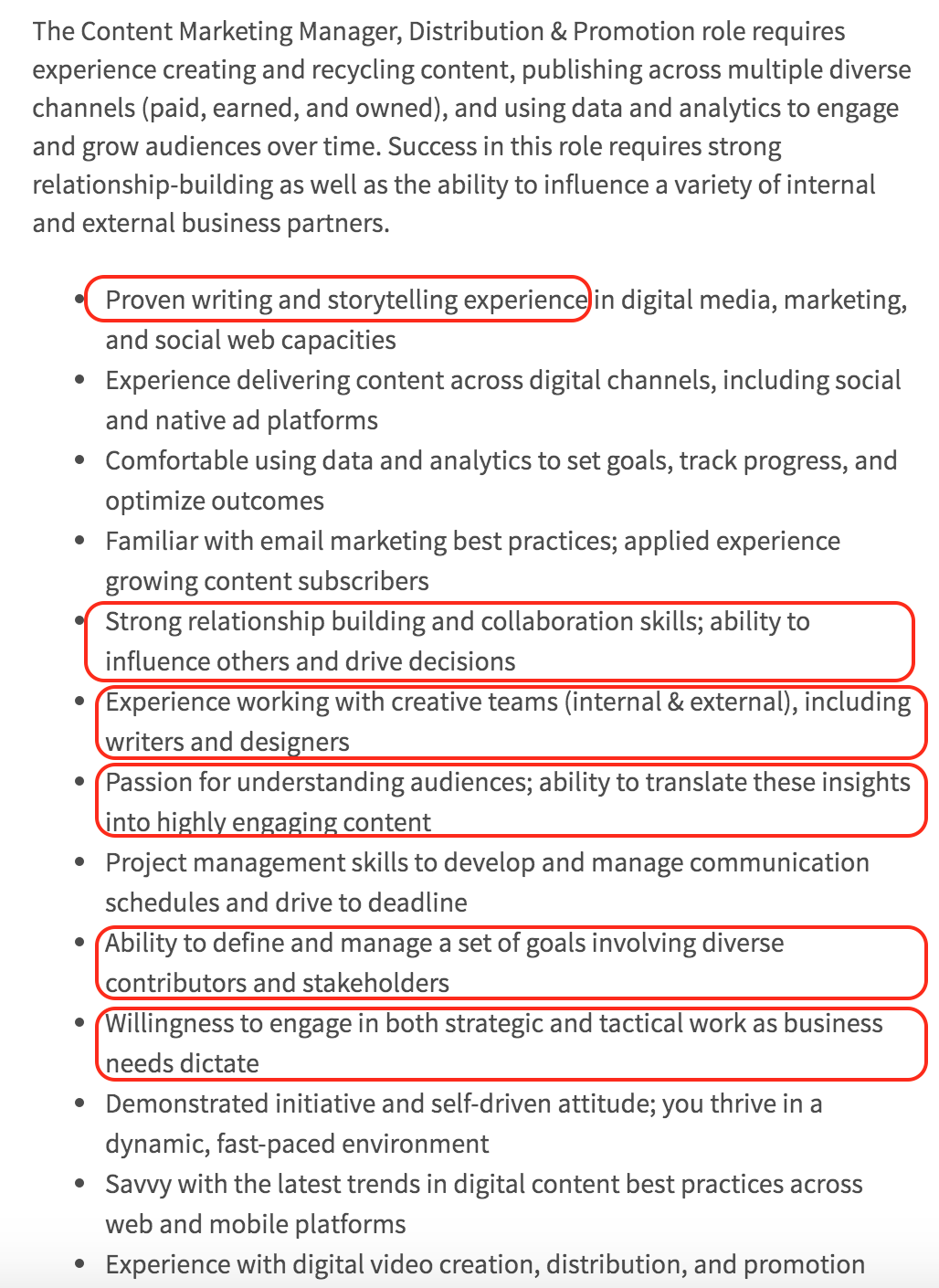
If you’re just starting out in your career, it’s going to be hard to know exactly what type of role would be good for you because you haven’t tried stuff out yet. The best advice I can give is to just take a role within marketing that you think you’d like so you can learn what you like and don’t like about the role. Everyone has to start somewhere, and you never know where that path may lead.
For me, my first corporate role was at a company called Vistage as a Social Media Coordinator. I didn’t know if I wanted to be in social media, but I took the job as a starting point in my career.
As it turns out, I ended up loving the role and excelling in it — eventually being promoted to Social Media Marketing Manager.
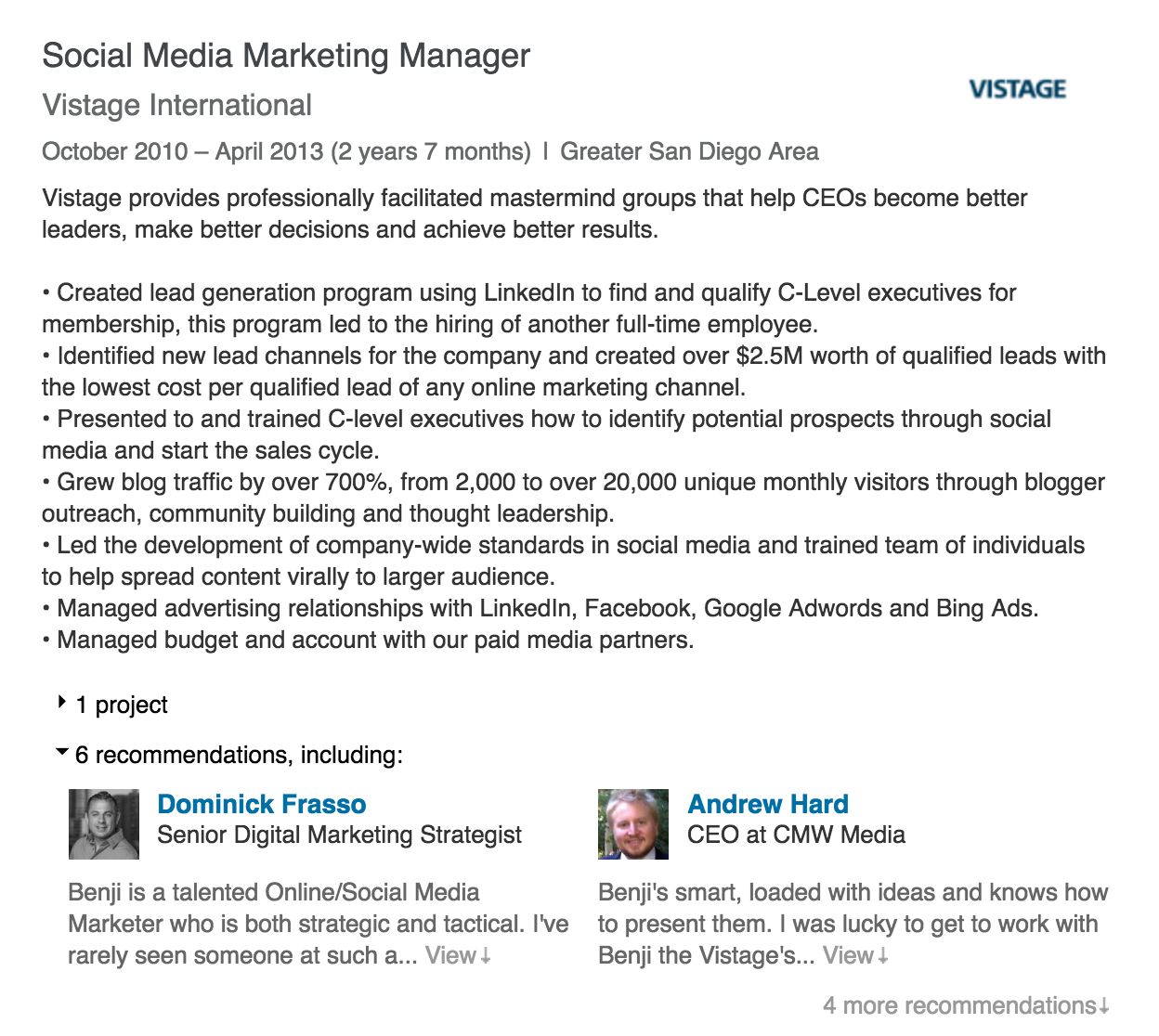
There were aspects of the role that I loved and aspects of the role that I didn’t like. However, over my 2.5+ year stint there, I was able to figure out what aspects of the role I loved and what I didn’t want to do going forward.
I had a lot of fun training our business coaches and flew around the country training them on LinkedIn; I built out our LinkedIn Advertising program and grew the Vistage blog substantially. Those were the aspects I loved about the job.
I realized that I didn’t like actually managing social media on a daily basis, being responsible for our email newsletter, and I didn’t want to pigeonhole myself as “a social media marketer.”
I started seeing the fall of managing social media profiles in the B2B world as a profession and the rise of content and inbound marketing as a growing position. So I decided to broaden out from just social media and start branding myself as a content marketing/ marketing manager.
If you had told me when I first started working that I would enjoy writing or that I would be good at managing a company blog, I would’ve told you “there’s no way, that’s not my skill set.” But as it turns out, I realized after doing the role that I loved aspects of my job that I never thought I would like. However, I wouldn’t have known that unless I tried it.
I needed to experience things to know for myself, and I think it’s the same for most people. You’ll never know unless you try.
Just take a role at a company you think you’d like working for and test the waters. After a year or so, go through the exercise above and figure out what you like and dislike about your role, then map out next steps.
Whether that’s a promotion, working at a new company, or it’s working in a completely different area of marketing…
Then: Build The Skills Needed for The Role You Want
If You’re Currently in a Job and Are Looking to Get Another One
Once you’ve identified what your next move is, figure out what skills you’re missing in your current role and talk to your manager about expanding your role into other areas.
For example, if you’re on the social media side of things and you want to transition into more of an email marketing role next, ask the person in charge of email marketing (or your manager) if you can shadow them. Ask if you can take over some of the smaller responsibilities and learn what they’re doing and why they do the things they do. This way when you start applying for roles in the area you want to go next, while you may have a title that typecasts you into one area of marketing, you have practical experience that you can share with the company that more aligns with what you’re looking for.
Expanding Responsibilities Outside of Your Company
“What if they say no?”
If you can’t find a way to nudge yourself into the responsibilities you want to learn within your own company, another option is to start freelancing on your own time with other companies in roles that you actually want.
Yes, freelancing is its own can of worms, but we’re not talking about quitting your job and starting a full time consultancy here. We’re just talking about gaining experience in the fields you want to learn more about so you can move into in your next job.
So, taking our earlier example of a social media coordinator wanting to move into email marketing, they could create a profile on a site like Upwork and slowly start taking on email marketing management contracts.
“But what if I have zero experience?”
That’s fine, start small. You don’t have to walk in and start managing email marketing for Airbnb. Take on small gigs to manage some Mailchimp campaigns for SMBs. There are a ton of small businesses and potential customers looking for help with “nitty gritty”, “just execute” type marketing roles and you can make up for experience early on with price and work your way up. Remember, you’re not trying to optimize for price anyways, you’re trying to get to a place where you can say things like:
“Yes, I’ve managed email marketing to existing customers for a mid-size eCommerce firm for 2 months.”
“Yes, I’ve created drip sequences from a PPC funnel for a few law firms. It’s analogous to what you’re looking for here.”
Another option would be to reach out to someone you really respect and ask to apprentice for them. While it may sound counterproductive to work for someone for free or for a low wage, you’ll probably learn 5x-10x as much in “real-world” skills from someone great, as you would trying to gain knowledge on your own.
If You’re Just Starting Out in Your Career
If you’re just getting started in your career what I recommend doing is working under a marketer, or for a marketing team, that you really respect and that you can learn from. I think going to a larger company right out of college is a good move because larger companies have more resources for training (on average). You can also go to a startup, but taking a role as the first marketing hire or on too small of a team can also be difficult if you don’t have someone you can learn from.
What else should you be doing to build marketing skills?
Read! Read books, blogs, articles, etc. Listen to podcasts and watch webinars. Network. Work on your communication skills.
In the last two years I’ve read over 50 books — these books have been crucial to forming my marketing mindset. Reading marketing blogs has also been beneficial to me — I get to see what the current trends are, other people’s perspectives and get to see where companies succeed or fall short.
Download my suggested reading list for marketers here
Experiment! Test things. Try to build a blog. Try web design. Just start testing marketing concepts for yourself. Even if your test fails, you’ll learn something from it. If you’re worried you don’t have a business idea, don’t stress. Build a site or blog around a topic of interest, and focus first on simply building an audience. First, remember your goal is to learn marketing. Second, if you happen to be wildly successful, you can always find a way to sell products to your audience (they don’t have to be your products). Finally, don’t be afraid to share your failures with companies… for the most part, they respect them. Just make sure to focus on what you learned from the failure.
How to Apply for Marketing Jobs
If you’re simply sending in a resume and cover letter hoping you’re going to get the job, you’re doing it wrong. You’re a marketer, you have to be more creative and market yourself in a way that catches the attention of the company.
While you might get lucky and land a role by just submitting a resume, your chances are slim. When applying for jobs these days, you’re competing against a lot of other marketers and the good jobs have between 40 to 100+ applicants. So, you need a way to stand out from the crowd.
How to Stand Out From the Crowd When Applying for Marketing Jobs
You could take a page out of Ina Herlihy’s book where she hustled to get the perfect job.
In short, she:
- Went to a ton of networking events where she knew high profile people would be present.
- Wrote a blog post about why she wanted to enter tech and marketing and cold emailed a bunch of CEOs of places that she wanted to work at (and got responses).
- She wrote a growth strategy for the company she really wanted to work for.
- She created a couple of growth projects for companies she wanted to work for and then emailed them the results.
- She wrote another blog post about how to optimize referral programs and included examples of companies and how they could improve them — then sent them to companies. She then got responses from a ton of companies wanting to talk.
- Then she wrote the post that I referenced above which I came across when I was at ThinkApps and remembered that when I went to Everwise. I cold emailed her and tried to hire her after reading her post (but she declined saying that she was happy where she landed a role, at Zumper).
I’m not suggesting you do all of those things to land a job but by being proactive, she got to pick and choose which jobs she wanted. Doing the activities above made her visible and coveted by various companies, founders and people that ran marketing.
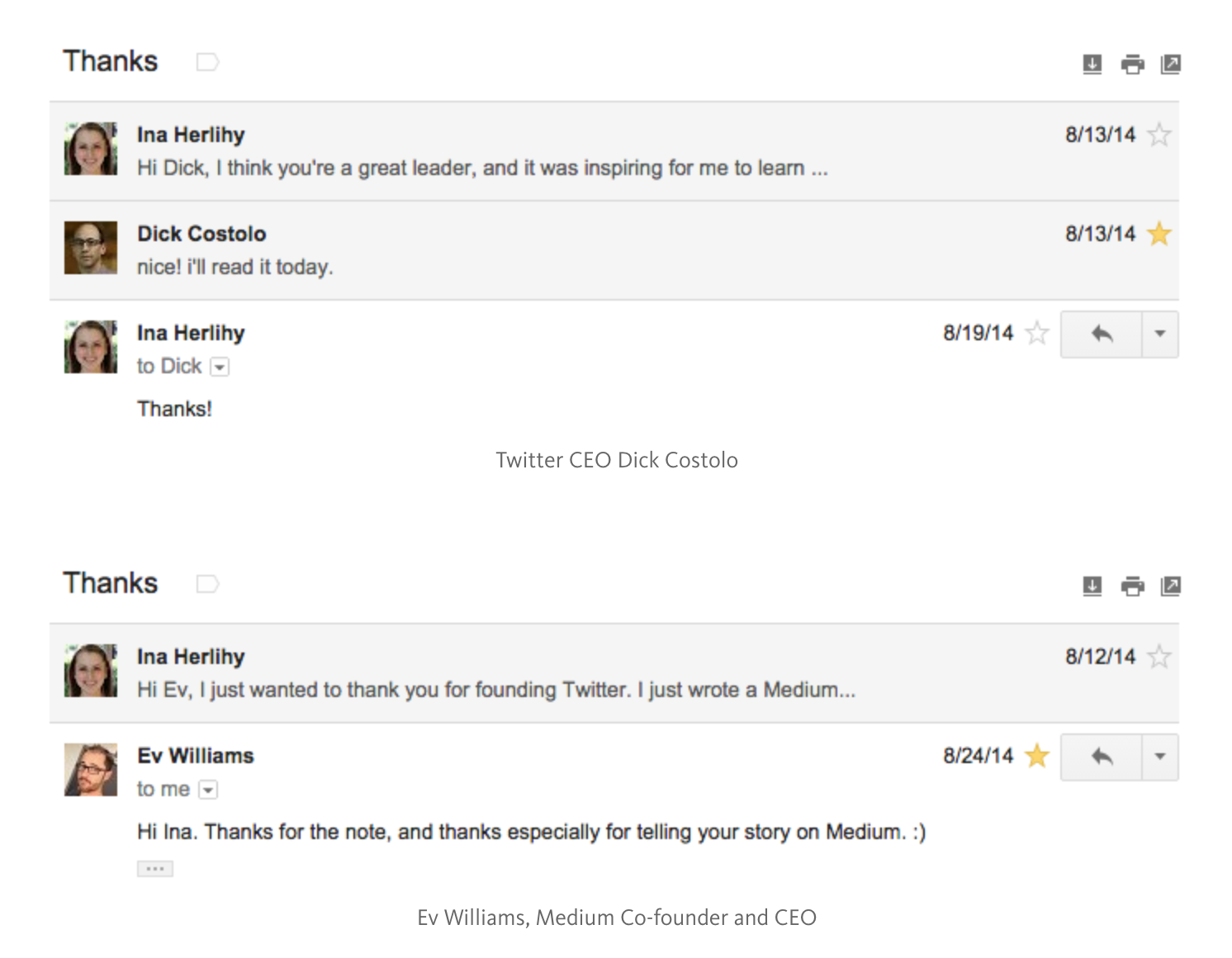
To stand out from the crowd these days, do something creative and add value to the company before you get hired. Show them how good of a marketer you really are.
Not only will it help you get a job, but it also puts you in a more powerful position with the company you’re interviewing with. If you make yourself a candidate that everyone wants, then you become much more valuable to a potential employer.
Another example is Nina Mufleh, a woman that really wanted to work at Airbnb. After failed attempts applying for roles by email and job postings, she decided to do something different.
She decided to create a resume that displayed her knowledge of Airbnb and the travel industry, and that highlighted a business opportunity that Airbnb was missing out on.
She then tweeted the CEO and CMO of Airbnb the resume, got a response, and landed an interview at the company.
Not only did spending the week to create this resume get her an interview at Airbnb, but it also got her interviews at Uber and LinkedIn as well.
By putting in the extra effort, it leads to better opportunities that other candidates could only dream of.
Things That I’ve Done to Land Interviews
I applied for and earned a media manager role at Intercom where I just sent a word document with every article I’ve written on distribution and a link to my LinkedIn profile as my resume. That landed me an interview the next day.
I’ve written multiple 90-day marketing plans for companies knowing that it’s usually one of the steps in the interview process for higher level positions. But by being proactive and doing this before I was in the interview process, it landed me the interview.
I’ve done research on companies long-term and short-term goals and cold emailed the CEO and Head of Marketing and shared how I could help them achieve their goals.
I’ve found someone on the marketing team at a company and cold emailed them asking them to chat about their experience at the company, then formed a relationship with them, and asked them to refer me.
I’ve cold emailed the hiring manager and asked them to meet for coffee to talk about their company.
Devesh has done similar things on the consulting front. He started his CRO agency by cold emailing a marketing agency CEO who is also a well known blogger and pitched his services.
He’s also cold emailed the CEOs of startups (e.g. Social Rewards) and eCommerce companies (e.g. Amerisleep) that have landed consulting gigs that are still active today.
The Moral of the Story: To Get a Marketing Job These Days, Add Value Before You Get Hired
Getting a job these days isn’t like it used to be — especially when it comes to getting hired for marketing roles.
The best thing that you can do is show companies that you’re a great marketer by adding value before you even land the role at the company.
While it requires a little more work upfront, the time investment will definitely be worth it when you land a job that you’re passionate about and that pays higher because you’ve shown what you’re worth before getting hired.
Finally, if you want to build your business and marketing knowledge while you’re searching, you can download my Suggested Reading List for Marketers, with 46 of the favorite books I’ve read, including exact reasons why I like each book.
Want us to write an in depth case study or story like this about you or your company? We’ll also drive traffic to it. Apply here.
Like this article? We produce stories like these for our clients, learn more here.
Suggested Reading List for Marketers
Where should we send the list?
You'll also be joining our email newsletter, where we send in depth content marketing articles (like this one) as well as exclusive email-only ideas about once a week. It's free and you can unsubscribe at any time.


